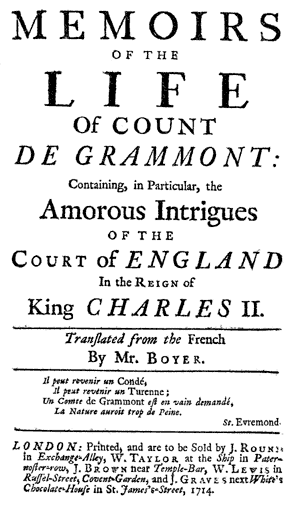 |
||
| . . . Chronicles . . . Topics . . . Repress . . . RSS . . . Loglist . . . | ||
|
|
|||||
| . . . de Grammont | |||||
| . . . 1999-07-04 |
Some folks are allergic to footnotes, but they can be used beautifully. Maybe my favorite single book is a nineteenth-century edition of The Memoirs of the Count de Grammont in which the footnotes take up considerably more pages than the text, since each name mentioned by the gossipy Count links to a collection of all other gossip available on the character. This web of links gives us a sense of closed community too irresistibly energetic to seem truly claustrophobic -- at least when viewed safely from the outside.
| . . . 2002-03-20 |
The English Restoration seems startlingly close, as if a veil was lifted for a few decades and then hurriedly pulled back into place for two hundred more years. Generations of state-church tussling, civil war, and dictatorship had left England a fragmented culture bound together by a tradition of insecurity, uncertainty, and paranoia. Installation of the most tolerant monarch in its history unloosed a flood of free expression: of sexual pleasures and horrors, atheism and fanaticism, financial panic and soured idealism, class distinctions crossed and fetishized, free love and cheating at cards....
All very twentieth century save for the lack of whining. Among Restoration writers, hypocrisy and self-pity were more unforgivable than failure or disgrace, since, after all, failure and disgrace lay so clearly outside an individual's control. Most valued was a slantwise directness of insight and impulse, coupled with a humorously stoic awareness of the probable consequences.
Although newspapers, novels, and television weren't yet in full swing, many other aspects of modernity snapped into focus: science blossomed free of alchemy and astrology; for the first time, women wrote professionally (including all-round woman-of-letters Aphra Behn); diaries and letters and memoirs suddenly became compulsively readable narratives rather than bare inventories of purchases or devotions; William Congreve's comedies (largely predicated on their young heroes' fears of bankruptcy) remain the best in the English language; John Wilmot, Earl of Rochester, remains the most exfoliative of English poets.
 For reasons we won't go into, the Victorian era offered little open support to its Restoration forebears, and into the mid-twentieth century much material was more or less supressed. Congreve stayed in print, though, and at present the writings of Pepys, Rochester, and the Female Wits are probably more accessible than ever before. But one of my favorite Restoration relics has never quite recovered its former visibility, and so I decided to produce an online edition.
For reasons we won't go into, the Victorian era offered little open support to its Restoration forebears, and into the mid-twentieth century much material was more or less supressed. Congreve stayed in print, though, and at present the writings of Pepys, Rochester, and the Female Wits are probably more accessible than ever before. But one of my favorite Restoration relics has never quite recovered its former visibility, and so I decided to produce an online edition.
|
Now Heav'ns preserve our faith's defender From Paris plots and Roman cunt, From Mazarine, that new Pretender, And from that politique, Grammont. -- John Wilmot, Earl of Rochester |
The memoirs of the Count de Grammont were written in French, but I associate them with the English Restoration since they were ghostwritten by Anglo-Irish Anthony Hamilton, since (apart from some short introductory chapters) they're set entirely in the court of Charles II, and since, most germanely, I know them through a remarkable nineteenth-century English edition aimed at the Sophisticated Gentleman.
As I've mentioned before, it's one of my favorite books, largely due to its internal linkage. But I'm finding it a bit intractable to both online publishing and online reading: luxuriant sentence structure, multipage paragraphs, and gargantuan notes all work more efficiently in paper technology than in computer hypertext, and the tiny none-too-tidy print clogs OCR.
A bit at a time seems the best way to proceed. And so, contrary to my previous practice, I'll be issuing the Memoirs in serial fashion.
Of this initial installment, I actually slighly prefer the bizarre Victorian wrapping to the contents proper, although Hamilton's declaration of methodology, Grammont's Sgt.-Bilko-like account of seventeenth-century warfare, and his easy socializing with both king and rebel during an armed rebellion all hold their charms.
Next in the hopper, though, is his introduction to the English court, and then we'll be cooking with gas!
| . . . 2002-04-01 |
This is also the 355th birthday of John Wilmot, Earl of Rochester, and what better way to remember the not-quite-national-over-there-either holiday than by pressing on to remember his most celebrated hoax?
In 1675 or 1676, possibly due to the discovery of "In th' isle of Britain" (a favorite of mine if not of Charles II), Rochester was banished from Court longer than usual, long enough to become bored enough to get into more elaborate trouble than usual. Thus he moved into the suburbs of London, disguised himself, and set up very successful shop as the noted quack doctor Alexander Bendo.
The Count de Grammont assures us:
Among all the compositions of a ludicrous and satirical kind, there never existed any that could be compared to those of Lord Rochester, either for humour, fire, or wit; but, of all his works, the most ingenious and entertaining is that which contains a detail of the intrigues and adventures in which he was engaged, while he professed medicine and astrology in the suburbs of London.Sadly, that composition, having circulated only in manuscript, has been lost, unless it's in some bishop's safe-deposit box somewhere.
Happily, "Doctor Bendo"'s advertising spiel, having been issued as an infomercial pamphlet, has survived. (In fact, it's probably the only genuine Rochester work to be printed by Rochester himself.) In honor of the occasion, I skip ahead in the Memoirs of the Count de Grammont to share it with you:
I'll only say something to the honour of the Mountebank, in case you discover me to be one. Reflect a little what kind of creature 'tis, he is one then who is fain to supply some higher ability he pretends to, with Craft, he draws great companies to him by undertaking strange things which can never be effected. The Politician (by his example no doubt) finding how the people are taken with specious, miraculous, impossibilities, plays the same game; protests, declares, promises I know not what things, which he's sure can ne'er be brought about; the people believe, are deluded and pleased; the expectation of a future good which shall never befall them draws their eyes off a present evil: Thus are they kept and establish'd in subjection, peace, and obedience; he in greatness, wealth, and power....
| . . . 2002-08-16 |
|
I have, thank God, a pretty large mouth....
And in another wonderful act of generosity, Olaf Simons adds to our notes on the Count de Grammont: I read the first English translation in the British Library {L: 10660.bb.8} some years ago. The French original had (by the way) been first published a year before in 1713 at Pierre Marteau's Publishing House in Cologne (the real publisher was probably situated at The Hague or Amsterdam). Mémoires de la vie du comte de Grammont; contenant particuliérement l'histoire amoureuse de la cour d'angleterre, sous le regne de Charles II. (Cologne: P. Marteau, 1713) - I saw the a copy of this edition at the British library {L: 614.b.2} as I had the curious pleasure to read practically all the gallant entertainment published in English and German between 1710-1720. (The first readers, by the way, supposed Grammont to be the author - not Hamilton his brother in law - see the second English edition published in 1719.) |
 |
| . . . 2005-05-16 |
Subject Without Nation: Robert Musil and the History of Modern Identity
by Stefan Jonsson
Stefan Jonsson reads like a nice guy. When he plays hunt-the-applicability against a full hand of voguish theorists, his point isn't to diagnose Musil away. His point is that The Man Without Qualities anticipates them.
Not in the sense of displacing them, of course. They remain authoritative; Jonsson is the advocate: "You see, Others and gentlemen, he's just like you and me!"
Anyway, no big deal. Jonsson's OK. The notion that Ulrich's Austria-Hungary wasn't just a satiric target, that its fecklessness could be mourned as a lost range of possibility, hadn't occurred to me, so I'm grateful for that, especially while I'm in mourning for Jimmy Carter's America. I read my fair share of awkward over-extended well-meaning prose aimed at an obscure audience, and I produce more than my share, and another three hundred pages of it isn't worth writing home about. It's not even worth writing The Valve about.
Instead I'm writing about stubbornness rewarded. After hacking through the main text, and then through all the endnotes 1 to the chapters, I reached the endnotes to the "Epilogue", and there — I think it was the third?— I reached a note 2 worth the whole effort. Take this quote from Musil's 1926 "Interview mit Alfred Polgar"3 and you'd get most of what I'd gotten from Jonsson's book:
"For this city [Vienna] has been besieged by the Turks and bravely defended by the Poles; in the eighteenth century it was the biggest Italian city; it is proud of its pastries, which stem from Bohemia and Hungary; and throughout the centuries it has proven that it is possible to accomplish beautiful, even profound things, if one has no character."
Giving it away for free seems like ill usage, but fair use.
1 Isn't that a nice way to do footnotes in HTML? See, it avoids these ugly interlinear gaps:

Then again, it might be a better idea to link or use bracketed digits instead....
2 Even those hooligans at Crooked Timber like footnotes. Footnotes seem to get less editorial supervision, for one thing — that's where Donna Haraway used to keep all her exclamation points. They're a terrific place to gesture towards alternative essays, the ones you wish you'd started writing once you start getting bored and frustrated with the one you're writing instead. Come to think of it, I encountered one of those in my recent Musil catch-up — a grim assessment of the state of Young Törless's morals with a more affirmative deconstructive reading sending runners between the conclusion and the notes. A Crooked Timber comment mentions the alternative history you can derive from Gibbon's footnotes; me, I'm crazy for the accretions of Walter Scott and others on the Memoirs of the Count de Grammont. It's like meeting a party of gossips after talking to a gossip. (It might have been with Grammont that I fell into the habit of saving up footnotes as a special treat, to cleanse the palate after finishing the chapter, or to be gorged on at the end.) Online, we see something similar happening in the comment threads of the Pepys blog. The weblog comment thread is usually compared to a discussion board, but it includes aspects of footnotes, marginal jottings, peer reviews, and Calls for Papers or Theme Issues.
3 "Some who wrote operas and symphonies live on only in a footnote."
Maryam Bazargani asserts:
in all but sweats with class bias
Copyright to contributed work and quoted correspondence remains with the original authors.
Public domain work remains in the public domain.
All other material: Copyright 2024 Ray Davis.